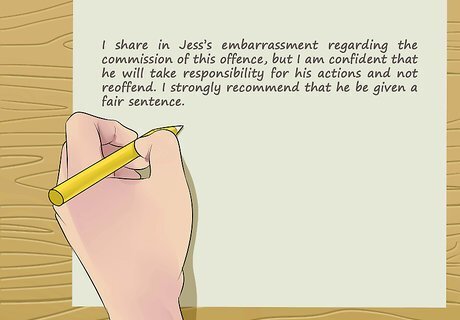
views
Preparing to Write the Letter

Understand the purpose. A character reference letter is a way to show the court that the defendant is a person of good character. In Australia, these letters are used during the penalty phase in order to help the judge determine an appropriate penalty. In the United States, reference letters are often submitted to an immigration court when an alien seeks to have his or her deportation cancelled. Character reference letters help the judge decide that the alien “deserves” to stay in the United States. Character reference letters are used much less frequently in criminal trials in the United States. Instead, it is common practice to have a character witness come into court and testify as to the defendant’s good character.

Ask why you were chosen to write a letter. Before you can write an effective letter, you should try to understand why the requestor has asked you to write the letter. Often, people request letters strategically: they want the person requested to write about something specific. You should feel free to ask why you were chosen and if there is an anecdote or something the requestor wants mentioned.

Find samples. You might want to search on the web for sample letters that other people have written. You should use these as only very rough guides. Always be sure to use specifics from your own experience.

Commit to being honest. The best letters will be in your voice, using your own language. You want to be authentic. Commit to total honesty. If you can’t write a positive character reference letter, then you should let the requestor know that. It is better to let the person choose someone else than try to write a positive letter when your heart isn’t in it.

Brainstorm. To help you write the letter, you should sit down for an hour and brainstorm ideas. Ask yourself the following, which can help you formulate your letter: How long and in what capacity you know the person. How often you have kept in contact. Whether you have spoken to the person about the offense. What you think about the person’s character. What the person’s reputation in the community is. Whether you believe the offence committed was out of character and why. Whether or not the person has shown remorse for the offence. What you know about the person’s background, including family, education, and employment history. Whether the person has drug, alcohol, or other problems. The hardships the person has suffered for having been caught committing the offence.
Drafting the Character Reference Letter

Insert the court’s address and the date. You should type your reference letter on regular white paper. At the top, on the left-hand side, insert the address where you will be sending the letter (e.g., the court). Then move down two lines and insert the date. If you have letterhead, then you should go ahead and use it. Using letterhead will make it look more official, and you should certainly use your letterhead if you are writing in a professional capacity (such as a doctor, employer, professor, etc.)

Add the salutation. After the date, drop down two spaces and add the salutation. You should begin the letter with “Your Honor.” Then space down two more lines.

Identify yourself. In the first paragraph, you should explain who you are and why you are writing. Specifically, you should explain how you know the defendant and in what capacity. If you are writing a character letter for a criminal defendant, for example, you could state, “I have known Jess McGann for six years, ever since we met in our first year in college. We worked together every summer and continued to stay in close touch after graduation. I understand he has been arrested for burglary. I am writing this letter to attest to his good character, which I believe warrants a lenient sentence.” If you are offering a character reference for immigration court, then be sure to include information about your own immigration status. You could state: “I am Catherine Steiner, the owner of Steiner’s Floral boutique and a U.S. citizen. For the past two years I have employed Abbey Rogers as a floral technician. Although I knew she had a green card, I was surprised to learn recently that it has been cancelled because of an aggravated battery she committed. I am writing to explain why I have always found her to be a person of integrity, and why I think the battery is out of character.”

Describe the requestor’s character. In the next paragraph, you will need to provide concrete specifics that illustrate the defendant’s character. Use specific examples or anecdotes. Doing so will make your writing more vivid and believable. Feel free to use more than one paragraph, if necessary. If you know someone in a personal capacity, you can describe situations that illustrate that you trusted the person’s character. For example, you might describe leaving your keys with the requestor to look after your pets while you were away: “I was surprised to learn of the offence Jess committed because I have always found him trustworthy. As an example, last year my wife and I visited friends in Europe. We gave Jess the key to our house so that he could pick up the mail, feed our pets, and tend to our garden. He gave me regular updates by email, and when my family returned home the house was in perfect shape. Nothing was missing.” Alternately, if you know someone primarily through a professional capacity, then you should write about your experiences with the requestor. You should still emphasize why you find the person trustworthy. For example, you may be the person’s boss. You could write, “In the two years I have employed Abbey, I have found her to be a reliable employee. When she began, I had her only working on the flowers in a back room, but I found her so capable that soon she was working at the counter, greeting customers. Within a month, I trusted her enough to allow her to conduct transactions. After six months, I had given her a key and allowed her to open and close the boutique. I have never trusted another employee to perform these tasks, and I think it is a testament to her character that I never had a second thought of entrusting her to handle the cash register or have a key to the building.”

Conclude with a strong recommendation. For example, you could state, “I share in Jess’s embarrassment regarding the commission of this offence, but I am confident that he will take responsibility for his actions and not re-offend. I strongly recommend that he be given a fair sentence.” Likewise, if you are writing a character reference letter to keep someone from being deported, then you should close by stating, “For the foregoing reasons, I strongly encourage the court to cancel Ms. Rogers’ removal” or words to that effect. In your conclusion, also include a phone number and email address (if you have one). This way, the judge can contact you if she or he wants. Also include a mailing address if one is not included on the letterhead.

Sign the letter. Letters should always be signed by you. Also insert the date near your signature as well. If you are providing a character reference letter for a deportation proceeding in the United States, then you should make sure that your letter is notarized. Accordingly, you should hold off on signing the letter until you appear before the notary public. Notary publics can be found in many courthouses. You can also check at large banks. Be sure to bring sufficient personal identification to show the notary: a valid passport or driver’s license should be sufficient.




















Comments
0 comment